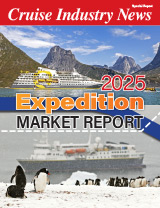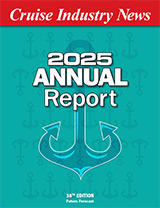Costa Crociere will be homeporting its European-clientele vessel, the Costa Playa, in Havana, Cuba, as of Nov. 4, according to Alfonso Lavarello, President of Milestone.
Monte Carlo-based Milestone, which is owned by Costa, comprises half of the joint venture Silares Terminales, the firm developing and overseeing cruise ports in Cuba. Lavarello confirmed that Silares Terminales has nine-year exclusive rights to operate the Havana cruise port.
The Costa Playa’s new itinerary will begin with an extended, overnight stay in Havana, according to Lavarello, then depart for the Cuban island of Pinos, followed by stops in Jamaica, Grand Cayman and Cozumel. The ship formerly homeported in Puerto Plata, Dominican Republic, with Cuban port calls in Santiago, Havana and Playa Caiman. The reason for the change, according to Lavarello: “The passengers wanted more time to stay in the capital of Havana, where there are a tremendous number of excursions and alternatives for them.” The itinerary also allows the Costa Playa to visit Mexico, which has much more name recognition than the Dominican Republic with European travelers, he explained.
The homeporting of the Costa Playa in Havana is a major step forward in the cruise company’s involvement with Cuba, complementing Costa’s financial interest in the island’s port infrastructure (The other half of Silares Terrninales joint venture is owned by UMP, the Cuban Government port and transportation ministry). “We inaugurated the new terminal facility in Havana on Dec. 2, 1995,” said Lavarello, noting that two additional port projects will be undertaken in Havana when demand warrants. In Santiago, work on the port facilities was completed last December, and new developments are reportedly planned for Mariel as well.
While Costa may have a strong financial stake in the Cuban cruise ports, It will not exclude rival lines from calling, Lavarello maintained. “Actually, we have two other cruise ships coming this November, a ship called the Don Juan, owned by the Spanish government, which carries 450 passengers, and a German ship.”
Regarding Costa’s ship, Lavarello stressed the strong demand for the Cuba product among Europeans. “Each week 500 passengers get off the ship in Havana. Costa has had a very positive response.” Indeed, the potential post-embargo business in Cuba is a hot topic in cruise circles, and Costa Crociere – through its current cruise calls and its subsidiary Milestone – appears particularly poised to take advantage of that future market. “The Cuban government is in no hurry to open to American tourists, but we invested because we do not think it (the opening of Cuba) is so far off,” Lavarello concluded.



